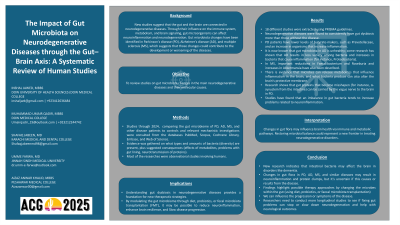Monday Poster Session
Category: Colon
P2414 - The Impact of Gut Microbiota on Neurodegenerative Diseases Through the Gut-Brain Axis: A Systematic Review of Human Studies


Inshal Jawed, MBBS
Dow Medical College
Karachi, Sindh, Pakistan
Presenting Author(s)
1Dow Medical College, Karachi, Sindh, Pakistan; 2Indiana University Southwest Internal Medicine Residency Program, Evansville, IN; 3Karachi Medical and Dental College, Karachi, Sindh, Pakistan; 4Jinnah Sindh Medical University, Karachi, Sindh, Pakistan; 5Peshawar Medical College, Karachi, North-West Frontier, Pakistan; 6Indiana University School of Medicine, Vincennes, IN
Introduction: New studies suggest that the gut and the brain are connected in neurodegenerative diseases. Through their influence on the immune system, metabolism, and brain signaling, gut microorganisms can affect neuroinflammation and neurodegeneration. Gut microbiota changes have been identified in Parkinson's disease (PD), Alzheimer's disease (AD), and multiple sclerosis (MS), which suggests that those changes could contribute to the development or worsening of the diseases.
Methods:
A systematic review was performed to gather studies on gut microbiota changes in the main neurodegenerative diseases and their molecular causes. Through 2024, studies comparing the gut microbiome of PD, AD, MS, and other disease patients to controls and relevant mechanistic investigations were consulted from the databases PubMed, Scopus, Cochrane Library, Embase, and Web of Science. Evidence was gathered on what types and amounts of bacteria (diversity) are present, plus suggested consequences (effects of metabolites, problems with gut lining, neurotransmission of proteins). Most of the researches were observational studies involving humans.
Results: This systematic review included 18 studies following PRISMA guidelines. Gut dysbiosis was consistently more common in patients with neurodegenerative diseases. PD patients showed reduced butyrate-producing bacteria (e.g. Prevotellaceae) and increased pro-inflammatory microbes. In AD, gut microbiota was less diverse and richer in inflammatory taxa like Proteobacteria. MS patients had lower levels of Faecalibacterium and Roseburia, with higher Akkermansia. Microbial metabolites may influence brain inflammation and affect the blood-brain barrier. Misfolded gut proteins, such as α-synuclein, may reach the brain via the vagus nerve in PD. Despite some variation, most studies link dysbiosis to increased neuroinflammation.
Discussion:
New research indicates that intestinal bacteria may affect the brain in disorders like dementia. Changes in gut flora in PD, AD, MS, and similar diseases may result in neuroinflammation and protein clumps, but it's uncertain if this causes or results from the disease. These findings highlight possible therapy approaches: by changing the microbes within the gut (using diet, probiotics, or faecal microbiota transplantation), we can influence the progression or symptoms of the disease. Researchers need to conduct more longitudinal studies to see if fixing gut problems can stop or slow down neurodegeneration and help with neurological outcomes.
Disclosures:
Inshal Jawed, MBBS1, Muhammad YN. Chaudhary, MBChB2, Muhammad Umair Qadir, MBBS1, Shafaq Jabeen, MD3, Umme Farwa, MD4, Aizaz Anwar Khalid, MBBS5, Oluwagbenga Serrano, MD, FACG6. P2414 - The Impact of Gut Microbiota on Neurodegenerative Diseases Through the Gut-Brain Axis: A Systematic Review of Human Studies, ACG 2025 Annual Scientific Meeting Abstracts. Phoenix, AZ: American College of Gastroenterology.
